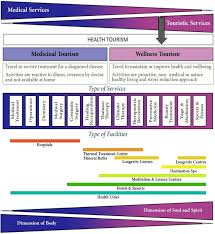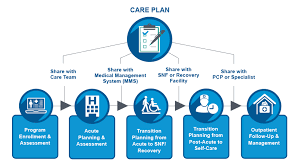
Exploring the Intersection of Health Tourism and Medical Tourism: A Comprehensive Guide
Exploring the Benefits of Health Tourism and Medical Tourism
Health tourism and medical tourism have gained significant popularity in recent years as more people seek high-quality healthcare services beyond their borders. Both terms are often used interchangeably, but they encompass distinct aspects of traveling for medical purposes.
Health Tourism
Health tourism refers to traveling to a different location for wellness and preventive care services. This may include spa retreats, holistic treatments, fitness programs, and rejuvenation therapies. Health tourists often seek relaxation, stress relief, and overall well-being enhancement during their trips.
Popular health tourism destinations offer a range of wellness activities such as yoga retreats, meditation classes, detox programs, and nutritional counseling. These experiences aim to promote physical, mental, and emotional balance while providing a break from daily routines.
Medical Tourism
On the other hand, medical tourism involves traveling abroad for specialized medical treatments or procedures that may not be readily available or affordable in one’s home country. Patients opt for medical tourism to access advanced healthcare services, experienced specialists, shorter waiting times, or cost-effective treatment options.
Common medical tourism procedures include cosmetic surgery, dental treatments, fertility treatments, orthopedic surgeries, cardiac procedures, and cancer treatments. Patients benefit from world-class facilities, cutting-edge technology, personalized care, and post-operative support when seeking medical treatment overseas.
The Benefits of Health Tourism and Medical Tourism
- Access to Specialized Care: Health tourists can access specialized healthcare services tailored to their needs with the latest advancements in medicine.
- Affordable Treatment Options: Medical tourists often find cost-effective treatment options without compromising on quality or safety standards.
- Cultural Immersion: Both health tourists and medical tourists have the opportunity to explore new cultures while receiving care in a supportive environment.
- Faster Treatment: Medical tourists benefit from shorter waiting times for consultations, diagnostics tests, surgeries, and follow-up care compared to their home countries.
- Holistic Well-Being: Health tourism promotes holistic well-being through a combination of relaxation techniques, physical activities, healthy nutrition plans,and mindfulness practices.
In conclusion,health tourism,,,,,,,,,,,,,,,,,,,.
Exploring the Benefits of Health and Medical Tourism: Affordable, Advanced Care with Cultural Enrichment
- Access to specialized healthcare services
- Cost-effective treatment options
- Exposure to advanced medical technology
- Experienced specialists and medical professionals
- Shorter waiting times for consultations and procedures
- Opportunity for cultural immersion and travel experiences
- Holistic approach to well-being and relaxation
- Personalized care and attention during treatment
- Post-operative support and follow-up care
Understanding the Challenges of Health and Medical Tourism: Language, Culture, Travel, and More
- Language Barriers
- Cultural Differences
- Travel Risks
- Post-Operative Care Challenges
- Legal Issues
- Quality Variability
Access to specialized healthcare services
One significant advantage of health tourism and medical tourism is the access to specialized healthcare services tailored to individual needs. Patients seeking treatment abroad can benefit from advanced medical technologies, specialized procedures, and experienced healthcare professionals who are experts in their respective fields. This pro allows individuals to receive personalized care and innovative treatments that may not be readily available in their home countries, ultimately leading to improved health outcomes and a higher quality of care.
Cost-effective treatment options
One significant advantage of both health tourism and medical tourism is the availability of cost-effective treatment options. Patients seeking wellness services or specialized medical procedures abroad often find that the expenses associated with their care are more affordable compared to receiving similar services in their home countries. This cost-effectiveness allows individuals to access high-quality healthcare without compromising on the standard of treatment they receive, making health tourism and medical tourism attractive options for those looking to optimize their health outcomes while managing expenses effectively.
Exposure to advanced medical technology
One significant benefit of both health tourism and medical tourism is the exposure to advanced medical technology. Patients traveling abroad for healthcare services have the opportunity to access cutting-edge medical equipment, innovative treatment methods, and state-of-the-art facilities that may not be available in their home countries. This exposure to advanced technology ensures that patients receive the most up-to-date and effective treatments, enhancing their overall healthcare experience and improving the outcomes of their medical procedures.
Experienced specialists and medical professionals
One significant advantage of health tourism and medical tourism is the access to experienced specialists and medical professionals. Patients seeking healthcare services abroad have the opportunity to benefit from the expertise of renowned doctors, surgeons, and healthcare providers who specialize in their respective fields. These experienced professionals bring a wealth of knowledge, skills, and innovative treatment options to ensure optimal care and successful outcomes for patients. By choosing health tourism or medical tourism, individuals can receive personalized attention from top-tier specialists who are dedicated to delivering high-quality healthcare services tailored to meet their specific needs.
Shorter waiting times for consultations and procedures
One significant advantage of both health tourism and medical tourism is the shorter waiting times for consultations and procedures. Patients who choose to travel abroad for healthcare services often experience expedited access to medical professionals, diagnostic tests, surgeries, and follow-up care compared to the lengthy waiting periods commonly seen in their home countries. This reduced waiting time not only ensures timely treatment but also contributes to a smoother healthcare experience, allowing patients to receive necessary care promptly and efficiently.
Opportunity for cultural immersion and travel experiences
Health tourism and medical tourism offer a unique opportunity for cultural immersion and enriching travel experiences. Patients traveling abroad for wellness retreats or medical treatments have the chance to explore new destinations, immerse themselves in diverse cultures, and engage with local traditions. By combining healthcare with travel, individuals can not only focus on their well-being but also broaden their horizons, gain new perspectives, and create lasting memories. This aspect of health and medical tourism enhances the overall journey, making it a holistic and fulfilling experience beyond just receiving treatment.
Holistic approach to well-being and relaxation
One of the key advantages of health tourism and medical tourism is the emphasis on a holistic approach to well-being and relaxation. Patients seeking healthcare services abroad not only receive top-quality medical treatments but also have access to a range of wellness activities aimed at promoting physical, mental, and emotional balance. This integrated approach ensures that individuals can rejuvenate their mind and body while undergoing treatment, leading to a comprehensive healing experience that goes beyond just addressing the physical ailment.
Personalized care and attention during treatment
One significant benefit of health tourism and medical tourism is the provision of personalized care and attention during treatment. Patients traveling abroad for healthcare services often receive individualized care tailored to their specific needs and preferences. This personalized approach ensures that patients feel valued, supported, and well-cared for throughout their treatment journey. Healthcare providers in popular health tourism destinations and medical facilities prioritize building strong patient-provider relationships, leading to a higher level of satisfaction and positive treatment outcomes. The focus on personalized care enhances the overall patient experience and contributes to a sense of trust and confidence in the healthcare services received during health tourism and medical tourism trips.
Post-operative support and follow-up care
Post-operative support and follow-up care are crucial benefits of both health tourism and medical tourism. Patients who undergo medical procedures abroad receive comprehensive post-operative care to ensure a smooth recovery process. This includes regular check-ups, monitoring of healing progress, medication management, and access to medical professionals for any concerns or complications. By offering personalized support after surgery, health tourism and medical tourism providers prioritize the well-being and successful outcomes of their patients, enhancing the overall experience and satisfaction with the treatment received.
Language Barriers
Language barriers present a significant con in health tourism and medical tourism, as they can impede effective communication between healthcare providers and patients. Misunderstandings or misinterpretations due to language differences can lead to errors in diagnosis, treatment, or post-operative care, ultimately impacting the quality of healthcare delivery. Overcoming language barriers through interpreter services or multilingual staff is crucial to ensuring that patients receive accurate information, understand their treatment options, and feel confident in the care they are receiving during their medical travel experience.
Cultural Differences
Cultural Differences pose a significant con in health tourism and medical tourism, as patients may encounter cultural shock or discomfort when navigating unfamiliar healthcare settings. The lack of familiarity with local customs, language barriers, and differing healthcare practices can impact the overall treatment experience for individuals seeking medical care abroad. This can lead to misunderstandings, communication challenges, and potential dissatisfaction with the level of care received, highlighting the importance of cultural sensitivity and support services in ensuring a positive and effective healthcare journey for patients engaging in health tourism or medical tourism.
Travel Risks
One significant con of health tourism and medical tourism is the potential travel risks associated with long-distance journeys for medical purposes. Patients traveling to foreign countries for healthcare may face challenges such as jet lag, deep vein thrombosis from extended periods of sitting during flights, or exposure to new infectious diseases prevalent in the destination country. These travel-related risks can impact the overall well-being and recovery process of individuals seeking medical treatment abroad, highlighting the importance of careful planning and consideration of potential health hazards during the travel phase.
Post-Operative Care Challenges
Post-Operative Care Challenges can pose a significant con for patients engaging in health tourism and medical tourism. Upon returning home after undergoing medical procedures abroad, patients may encounter obstacles in accessing necessary follow-up care or addressing potential complications that arise post-operation. The distance from the healthcare facility where the procedure was performed can create logistical challenges in coordinating ongoing treatment, monitoring recovery progress, and managing unexpected issues effectively. This lack of seamless continuity of care highlights the importance of thorough pre-planning and communication between healthcare providers in different locations to ensure optimal post-operative outcomes for patients seeking treatment overseas.
Legal Issues
Legal issues are a significant con associated with health tourism and medical tourism. Patients engaging in medical tourism often face the challenge of navigating diverse legal systems and varying standards of care across different countries. This complexity can potentially result in confusion or disputes, particularly in cases of adverse outcomes or complications arising from treatments received abroad. Understanding and addressing legal considerations is crucial for individuals considering health tourism to mitigate risks and ensure proper recourse in the event of any legal challenges.
Quality Variability
Quality variability is a significant con associated with health tourism and medical tourism. In certain destinations catering to medical tourists, there can be inconsistencies in the quality of healthcare services provided. This variability raises valid concerns regarding standards, safety measures, and accreditation processes. Patients considering medical travel must carefully research and select reputable facilities with recognized certifications to ensure they receive the highest quality care and treatment outcomes.


